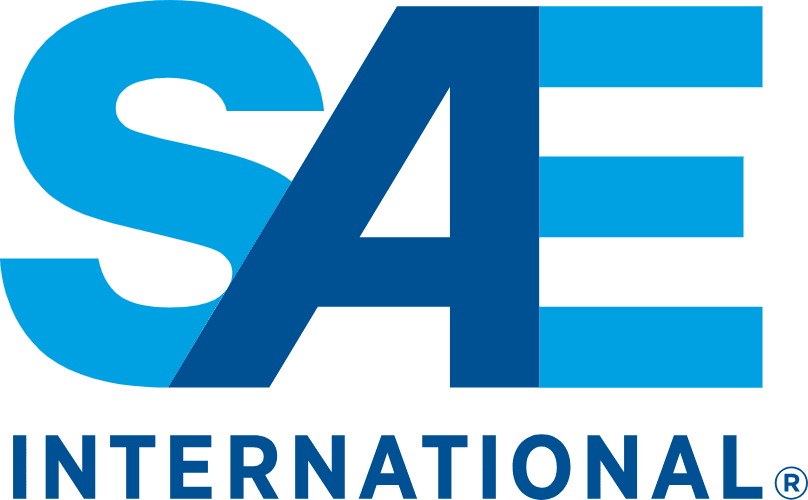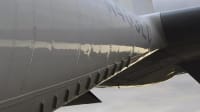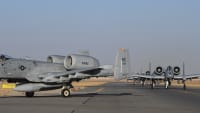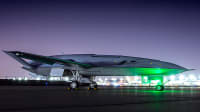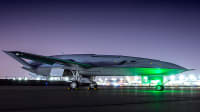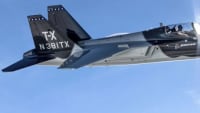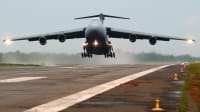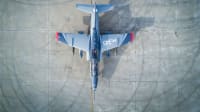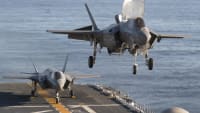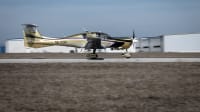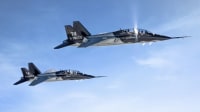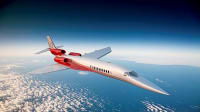Boeing KC-46 Program Completes Flight Testing Required for First Delivery to U.S. Air Force
“Receiver” refueling certification will conclude before Initial Operational Test & Evaluation
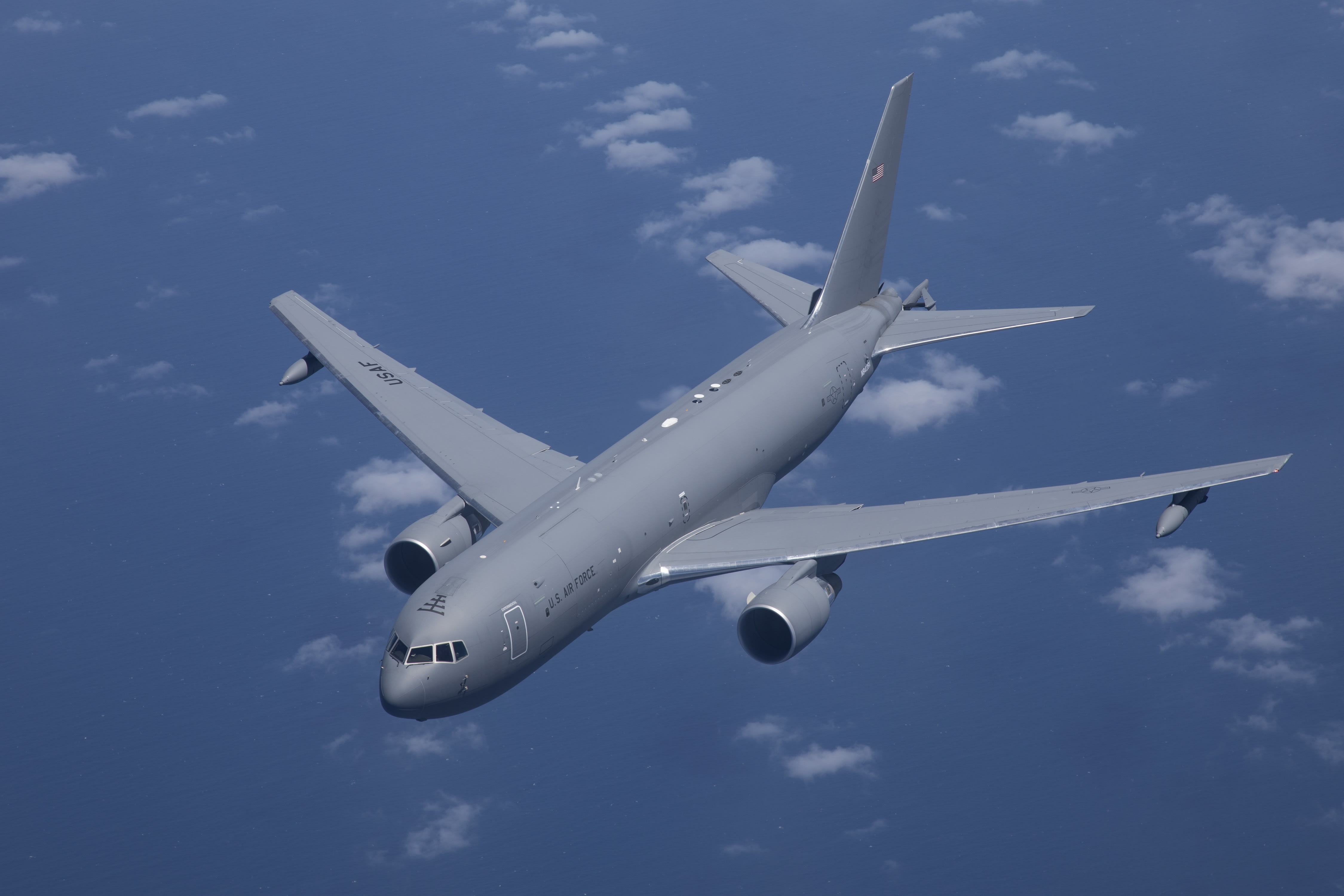
Boeing and U.S Air Force teams recently achieved a major KC-46 Pegasus tanker program milestone, completing all flight testing required for first delivery. This past week, the KC-46 team concluded both its Military Type Certification (MTC) testing and receiver certification testing with KC-135 , F-16 , and C-17 aircraft.
“This is a significant achievement for the Boeing-Air Force team and continues us on our path to first delivery in October,” said Mike Gibbons, Boeing KC-46A tanker vice president and program manager.
Receiver certification, which began in April, was conducted from Boeing Field in Seattle and Edwards Air Force Base, Calif. As part of the testing, KC-46 and receiver aircraft flew at different airspeeds, altitudes, and configurations to ensure compatibility and performance throughout the refueling envelope of each receiver.
Receiver certification testing of A-10 and KC-46 has also begun, with final certification of A-10, F/A-18 , KC-46, F-15 and B-52 to be completed prior to the start of Initial Operational Test & Evaluation testing.
When in service, the KC-46 will refuel U.S., allied and coalition military aircraft, but also must be able to take on fuel to extend its operational range—hence the need for a KC-46 to KC-46 refueling certification.
“Our main focus now is obtaining the Supplemental Type Certificate (STC) from the Federal Aviation Administration as well as the formal Military Type Certification from the U.S. Air Force,” Gibbons said.
The program has six KC-46 aircraft that have supported various segments of STC and MTC testing. Overall, they have completed 3,300 flight hours and offloaded two million pounds of fuel during refueling flights with F-16, F/A-18, AV-8B , C-17, A-10, KC-10 , and KC-46 aircraft.
The KC-46, derived from Boeing’s commercial 767 airframe , is built in the company’s Everett, Wash., facility. Boeing is currently on contract for the first 34 of an expected 179 tankers for the U.S. Air Force, which will replace aging Boeing KC-135 Stratotankers; the last of which were built in 1965.
To refuel other aircraft, the multirole tanker is equipped with a telescoping boom, and flexible hose and drogue systems. The boom can transfer up to 1,200 gallons of fuel per minute, while the hose and drogue systems, located on both the plane’s wing and centerline, enables the KC-46 to refuel smaller aircraft at a rate of 400 gallons of fuel per minute. In addition to space for the crew of three – two pilots and one boom operator – the KC-46 Pegasus also has dedicated space for 15 additional crew members or aeromedical staff.
Additionally, the reconfigurable cargo deck of the KC-46 can hold up to 54 medical patients or up to 114 troops.
William Kucinski is content editor at SAE International, Aerospace Products Group in Warrendale, Pa. Previously, he worked as a writer at the NASA Safety Center in Cleveland, Ohio and was responsible for writing the agency’s System Failure Case Studies. His interests include literally anything that has to do with space, past and present military aircraft, and propulsion technology.
Contact him regarding any article or collaboration ideas by e-mail at
Top Stories
INSIDERManufacturing & Prototyping
![]() How Airbus is Using w-DED to 3D Print Larger Titanium Airplane Parts
How Airbus is Using w-DED to 3D Print Larger Titanium Airplane Parts
INSIDERManned Systems
![]() FAA to Replace Aging Network of Ground-Based Radars
FAA to Replace Aging Network of Ground-Based Radars
NewsTransportation
![]() CES 2026: Bosch is Ready to Bring AI to Your (Likely ICE-powered) Vehicle
CES 2026: Bosch is Ready to Bring AI to Your (Likely ICE-powered) Vehicle
NewsSoftware
![]() Accelerating Down the Road to Autonomy
Accelerating Down the Road to Autonomy
EditorialDesign
![]() DarkSky One Wants to Make the World a Darker Place
DarkSky One Wants to Make the World a Darker Place
INSIDERMaterials
![]() Can This Self-Healing Composite Make Airplane and Spacecraft Components Last...
Can This Self-Healing Composite Make Airplane and Spacecraft Components Last...
Webcasts
Defense
![]() How Sift's Unified Observability Platform Accelerates Drone Innovation
How Sift's Unified Observability Platform Accelerates Drone Innovation
Automotive
![]() E/E Architecture Redefined: Building Smarter, Safer, and Scalable...
E/E Architecture Redefined: Building Smarter, Safer, and Scalable...
Power
![]() Hydrogen Engines Are Heating Up for Heavy Duty
Hydrogen Engines Are Heating Up for Heavy Duty
Electronics & Computers
![]() Advantages of Smart Power Distribution Unit Design for Automotive...
Advantages of Smart Power Distribution Unit Design for Automotive...
Unmanned Systems
![]() Quiet, Please: NVH Improvement Opportunities in the Early Design...
Quiet, Please: NVH Improvement Opportunities in the Early Design...
